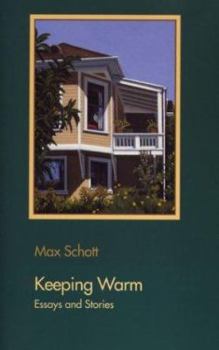Keeping Warm: Selected Essays and Stories
No Synopsis Available.
Format:Paperback
Language:English
ISBN:1880284642
ISBN13:9781880284643
Release Date:February 2015
Publisher:Daniel & Daniel Publishers
Length:255 Pages
Weight:0.75 lbs.
Dimensions:0.8" x 5.6" x 8.5"
Customer Reviews
2 ratings
Seriously And Permanently For Keeps
Published by Thriftbooks.com User , 19 years ago
I've read Max Schott often and in quantity. But I have taken him for granted in the same way I take salt for granted. Essential, but do I notice? When "Keeping Warm" came out, I got it and a couple of friends did too. Later we were at a party and talk had grown sluggish. One friend said, "'Keeping Warm' is wonderful--it's the best thing I've read all year." The conversation perked up. "Yeah," somebody said, "it's like he discovered this new subject, the land of old people--the part about how he figures out at almost the last minute that he's been wrong about his father! And you get this huge shift in direction and understanding, like the end of an Ice Age, but it's done so naturally. " Talk went on in non sequiturs. "He was a real working cowboy." This for the benefit of somebody who didn't know about Max Schott's more respectable past. "Then he became a college teacher. Oh and the essay about teachers!" In that one, a she-devil, evidently an old friend, appears and talks with Schott: "It began with a pinch, a sharp little pinch on my arm, and then she said, "Why, in the half-century you've been in school have there been only half a dozen good teachers? And why are the thousands who aren't good, so bad, so terribly, terribly bad?" (page 138) What makes the essay good is that people don't usually admit that most teachers are bad. But if you think of your own experience from kindergarten through whenever you exited the academic coil, you have to admit, it was a long dark hallway survivable because compulsory and occasionally illuminated. "Keeping Warm" feels so effortless, and funny, that it's hard to believe it is written. It's as quick and felxible as thought. And while I am reading it I feel that the intelligence is contagious and I have caught it. I have that illusion when I read Jane Austen or Chaucer, too. "Keeping Warm" holds different kinds of writing on disparate subjects, such as guiding horses on tricky clay hillsides and the gods of violin--not to mention "Turpitude & Rectitude" and "The Fashion Plate." To praise it is, in a way, beside the point. It's the work of a world-class writer at the height of his powers. And one could overlook the world-class part, because Schott's writing has a kind of disarming modesty. You get involved in what's happening and forget that an artist made it. I think that really great art does that, creates fresh air, but you're used to breathing so it feels familiar, just better than usual. "Keeping Warm" is a keeper. It's imperative.
For Keeps
Published by Thriftbooks.com User , 19 years ago
Max Schott's Keeping Warm is a wonderful collection of thirty-two stories and essays that dabble with everything from lassoing horses in Oregon to confronting a triple by-pass operation. Schott's genuine curiosity about the world around him makes the wide variety of topics covered a pleasure to read, no matter what the subject matter.For instance, his diary entries contain observations about people in which the simple prose contains a rich and entertaining empathy: "A boy sitting in the middle of Islay Street, outside my window. Not the boy that usually plays there; a visitor. About nine years old. He looks disconsolate, head down, his baseball bat is lying between his legs on the pavement. He raises his head and shouts at the top of his lungs, 'Hey! Ronny!' From somewhere out of sight--probably his own porch--Ronny calls back 'What?' The boy on the street, nearly as loud as before: 'Do you hate me?' The other boy, impatiently: 'No!' The boy on the street, not so loud, evidently relieved: 'Okay. Then I don't hate you.' A few minutes later, they are playing again, though their voices continue to sound strained and crabby."Due to his candor, even Schott's academic topics display his talent to make any subject compelling:"Looking back at 'Song of Myself' with the subject in mind, I'm surprised to see how much time Whitman spends talking about death. (It occurs to me that those people who really aren't afraid of death probably spend very little time thinking or talking about it, cheerfully or otherwise.) Some of what he says just sounds like wishful thinking, or if it isn't, at any rate comes off as ludicrous assertion: The smallest sprouts show there really is no death (37)"Keeping Warm offers something for nearly every reader. Not too many authors can tackle Darwinism, describe their conflicted relationship with their father, and then follow up with a humorous anecdote about sending a daughter off to college. Max Schott accomplishes all of the above.




